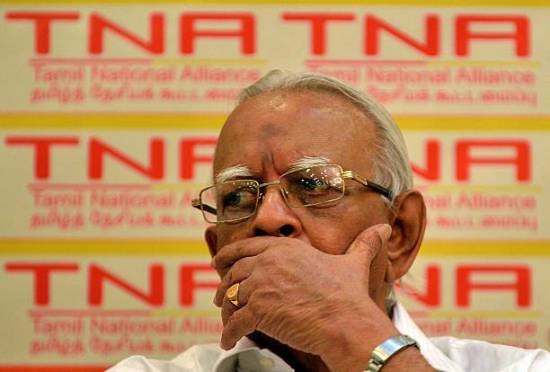TNA calls for federal setup with self-determination rights
Amidst presidential push for 13A implementation
COLOMBO – The Tamil National Alliance (TNA), the main Tamil political party in Sri Lanka, has renewed its demand for a federal system with self-determination rights, amidst President Ranil Wickremesinghe’s efforts to implement the 13th Amendment to the Constitution.
Last week, President Wickremesinghe made a special address to Parliament, urging all political parties to collaborate in the implementation of the 13A while excluding police powers.
However, TNA leader R. Sampanthan in a letter addressed to the President on Monday (14) reiterated the party’s commitment to a federal solution.
“We have repeatedly obtained a mandate from the Tamil populace in the North and East to work towards a political solution based on a federal structure consonant, with the right of self-determination in the area of our historical habitation,” the letter stated.
Recalling India’s pivotal role in 1987 on 13A, the veteran Tamil leader reminded Wickremesinghe that, despite the devolution of powers to the provinces envisioned by the amendment, the constitution’s unitary nature has at times led to the central government reclaiming the devolved powers.
“India offered its good offices in 1983, which were accepted by the Sri Lankan government, culminating in the signing of the Indo-Lanka accord on July 29, 1987,” he said in the letter.
The TNA urged Wickremesinghe to “expeditiously implement all the powers granted to the provinces in the Constitution and hold the long-delayed provincial council elections”.
The 13A was brought in after the India-Sri Lanka agreement of 1987. It created nine provinces as devolved units with a temporary merger of the Northern and Eastern Provinces.
The elections for the nine provinces have been on hold since 2018 following a move to introduce electoral reforms. It now needs a parliamentary amendment to enable the elections to be held under the existing proportional representation system.
President Wickremesinghe has been reiterating that he would bring in the 13A amendment to make the system of provincial councils more meaningful by reducing the central government’s powers to curb their functioning.
He has said the stalled provincial council elections could be held after the Parliament’s agreement on their powers.
Wickremesinghe’s actions have drawn criticism from hardline Sinhala majority groups and influential Buddhist clergy members. Several prominent monks have issued statements expressing their intent to challenge the president, alleging that his approach could pave the way for the establishment of a separate Tamil state in the northern and eastern regions.
Critics accuse Wickremesinghe of relying on the support of the Tamil minority to secure victory in the presidential election, scheduled for the last quarter of 2024.
Sri Lanka has had a long history of failed negotiations to end the Tamil claim of discrimination by allowing some form of political autonomy.
The Tamils put forward their demand for autonomy after gaining independence from Britain in 1948, which from the mid-70s turned into a bloody armed conflict.
The Liberation Tigers of Tamil Eelam (LTTE) ran a military campaign for a separate Tamil homeland in the Northern and Eastern provinces of the island nation for nearly 30 years before its collapse in 2009 after the Sri Lankan Army killed its supreme leader Velupillai Prabhakaran.
According to Sri Lankan government figures, over 20,000 people are missing due to various conflicts, including the three-decade brutal war with Lankan Tamils in the north and east, which claimed at least 100,000 lives.
-PTI



Comments are closed, but trackbacks and pingbacks are open.